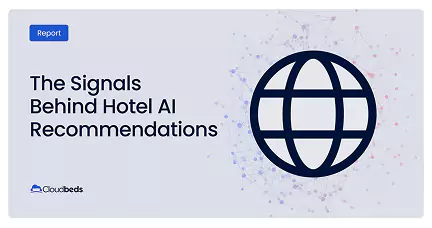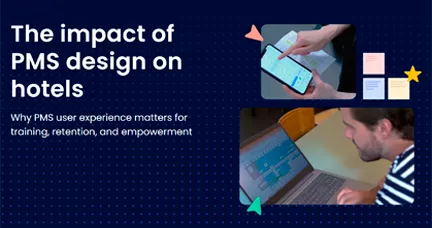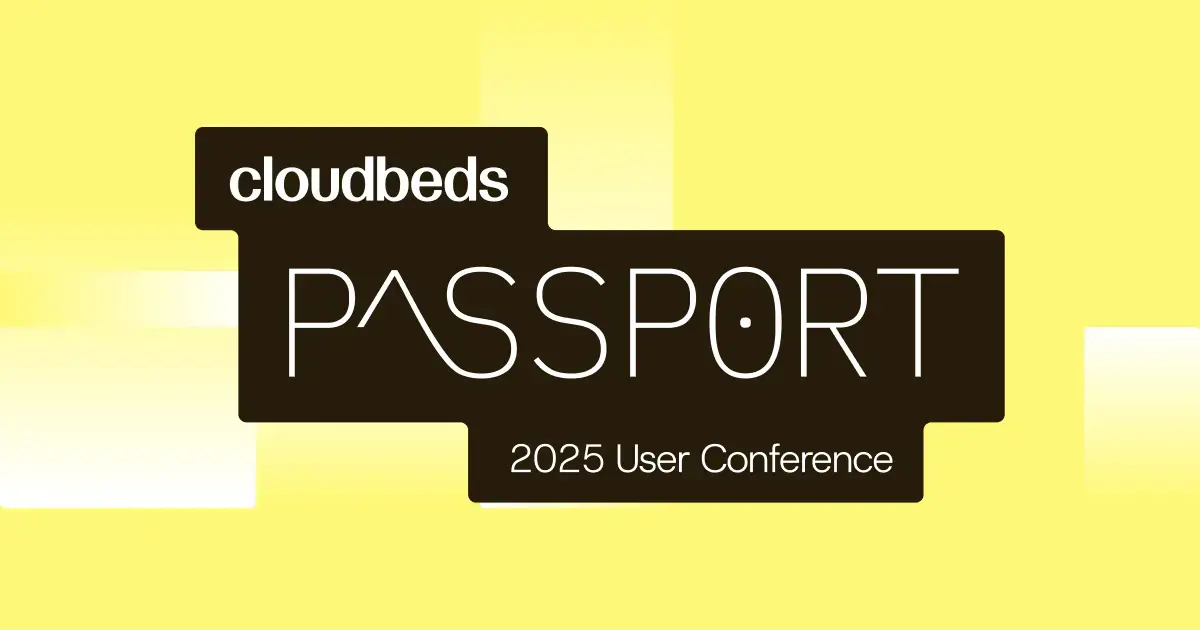Criticism may not be agreeable, but it is necessary. It fulfills the same function as pain in the human body. It calls attention to an unhealthy state of things.
These wise words from Winston Churchill still ring true today, and they’re especially true in the hospitality industry.
If you’re passionate about your work and proud of your team, criticism can hurt. But if guests don’t bring issues to your attention, you may never know they exist, and won’t be able to make improvements.
Fortunately, if you manage the guest experience expertly, most guest feedback will be positive—and that’s a lot more pleasant for guests and employees alike. To help you prevent negative reviews and earn more of those coveted five-star reviews, we share tips, strategies, and tools for controlling direct guest feedback.
What is guest feedback?
Guest feedback can be defined as information, such as impressions and suggestions, that guests share about their experience at a property. The feedback is meant to communicate how satisfactory their stay was, whether positive or negative. It includes everything from complaints and suggestions to recognition and praise.
Guest feedback provides a strong indication of guest satisfaction and loyalty. It often covers the full range of the hotel guest‘s experience, from check-in to check-out and everything in between. For this reason, it‘s actively solicited by many hotels and closely scrutinized as a key performance indicator (KPI) for guiding improvements.
Today, most customer feedback is either shared directly with a property in the form of in-person comments and post-stay surveys or indirectly on public channels like online review sites and social media. Feedback can be very broad, such as a property rating on Booking.com, or very specific, such as detailed remarks shared in a guest survey.
Why is guest feedback important?
Guest feedback matters to hotels – and all other types of lodging businesses, from B&Bs and inns to hostels and short-term rentals – because happy guests are more likely to become loyal guests, whereas unhappy guests are more likely to stay elsewhere.
Not only that, but unhappy guests may become detractors, voicing their opinions in public forums like online reviews. This can be damaging to the hotel’s reputation and can deter other travelers from booking. On the other hand, happy guests may become promoters or advocates, sharing their positive experiences in online reviews and recommending your property to others. Good reviews can boost the property’s reputation and encourage more travelers to choose it for their next stay.
Guest feedback is a gift. As a hotelier, you can’t be everywhere at all times, so you rely on guests to share what they’re thinking, experiencing, and feeling. These insights can help you with service recovery and identify any changes necessary to prevent detractors and create more advocates.
How can hotels use guest feedback?
Guest feedback serves two main purposes in the hotel industry:
- It improves hotel operations – revealing your guest sentiments and indicating what you’re doing well and where improvements are needed to earn guest satisfaction and loyalty.
- It also serves as a marketing tool, helping convince travelers to choose your property. Positive guest reviews can be showcased in email marketing, across OTA channels, and on your website.
Positive feedback can be used by hotels to:
- Recognize team members for a job well done
- Motivate staff to make improvements to deliver a better customer experience
- Identify strengths to highlight in promotional messaging
Negative feedback can be used to:
- Identify staff training needs
- Guide improvements to standard operating procedures
- Prioritize property upgrades
For independent properties, a prompt follow-up to guest feedback can offer distinct advantages over chain properties and big brands, which can’t always be as agile. By adapting quickly to changes in guest preferences, you can earn better hotel reviews and higher ratings, which in turn will give potential guests more confidence to choose an unknown property over a recognized brand.
Quantitative vs. qualitative guest feedback
While all types of feedback are important, guest satisfaction surveys, questionnaires, and online reviews are the most common and useful ways to collect guest feedback. Surveys are feedback forms sent to guests after their stay to solicit feedback on various aspects of their experience. Reviews are ratings and commentary posted by guests to online platforms like Tripadvisor, Google, Airbnb, and other online travel agencies (OTAs).
Reviews and surveys provide both quantitative and qualitative feedback. Quantitative feedback is structured and measurable. Typically, it comes in the form of a number rating on a scale. These metrics can be collected and collated over time, providing an ongoing measurement of performance.
Qualitative feedback is unstructured and descriptive. It usually comes in the form of freeform commentary in a survey or review. After providing ratings, guests are prompted to elaborate with comments. While qualitative feedback is harder to measure than quantitative feedback, it often provides deeper insights and important details. Bad reviews often contain a lot of valuable information for hotels and can help prevent negative experiences in the future.
Online reviews vs. guest feedback surveys
What’s more important, reviews or surveys? It depends on your objectives. Guest surveys provide hotels with more control over feedback. You can select the questions you wish to ask and decide which guests to send surveys to and when.
Properties can leverage reputation management solutions integrated with their property management system (PMS) to help automate the survey collection process. When a guest completes a survey, the response is sent directly to you, so you know who the guest is and can resolve any issues privately.
Online reviews, on the other hand, are hosted by review sites, and they decide which questions to ask. Reviews are often posted anonymously, so hoteliers don’t know who the feedback is from or, in some cases, if the reviewer stayed at the property.
As mentioned, because reviews are posted publicly, they can have a direct impact on room demand. If a property has negative reviews, new guests may shy away from booking there, whereas if the property has positive reviews, more travelers will be drawn to it.
Given the pros and cons, it’s a good idea to collect both types of feedback.
6 steps to managing guest feedback
To ensure that guest feedback receives the attention it deserves, it’s important to take an organized, systemic approach to feedback management. This involves five key steps:
- Listen. Put into place systems and notifications for monitoring guest feedback to ensure you’re alerted as soon as a review or survey is submitted
- Share. Share feedback with applicable employees, using it as a constructive learning tool and a way to recognize them for outstanding work.
- Take action. When feedback is negative, find out what went wrong and take prompt action to fix the problem and prevent it from recurring.
- Respond. Minimize damage by limiting response rates to negative reviews and surveys within 24 hours. And don’t forget to thank guests for positive feedback as well.
- Measure. Set objectives, such as your overall rating, departmental ratings, Net Promoter Score, and Tripadvisor ranking, and track progress toward achieving them.
- Automate. Use a guest engagement solution to help facilitate guest communication and automate feedback solicitation and collection.
Guest feedback strategies for independent properties
Here are some tips and strategies for feedback collection and using it to increase customer satisfaction and loyalty.
Solicit feedback
Don’t wait for guests to tell you what they think – ask them. According to Tripadvisor, travelers read an average of nine reviews before making a booking decision, and they focus on the most recent reviews. By sending post-stay requests for an online review, you’ll help ensure travelers have a good selection of recent reviews and the confidence to choose your property.
Pursue a diverse review strategy
Managing reviews on OTAs like Booking.com and Expedia, should be a priority, but don’t overlook other places guests may be submitting reviews, like Google and Tripadvisor. Strive to maintain fresh reviews and a five-star rating on all sites where travelers find and book your property.
Ask for real-time feedback
Don’t wait to learn about guest disappointments in a review. Check in with them during their stay with an in-stay survey, SMS text message, or in-person query. Train staff members to be on the lookout for signs of trouble and empower them to resolve issues quickly and go the extra mile to exceed guest expectations.
Show leadership
Welcome all types of feedback with courtesy and grace. Never complain about guests or obsess over negative reviews. Show your colleagues that all feedback is important. Listen, learn, and move on.
Don’t delay
Churchill also said that if criticism is heeded in time, danger may be averted, but “if it is suppressed, a fatal distemper may develop.” Don’t allow issues to fester. Seek timely resolutions to issues no matter how seemingly large or small.
Tailor your responses
Write thoughtful responses to reviews and surveys, addressing specific comments. Thank the guest, apologize for any lapses in quality or service, and say how you’re following up. Your efforts will pay off. In a Tripadvisor survey, 89% of respondents said that a thoughtful response to a negative review improved their impression of a business.
When feedback is sensitive or potentially damaging, it may be best to pick up the phone and call the guest to resolve the situation directly. Then post a response to show how you’ve followed up.
Celebrate achievements
Make a habit of sharing rave reviews at staff meetings, on bulletin boards, and one-on-one with employees. When you reach a milestone objective like a target Tripadvisor ranking or NPS score, hold a gathering to celebrate.
3 essential guest feedback tools
Hoteliers have all sorts of tools at their disposal to help collect, monitor, analyze, and benchmark guest feedback. Here are a few to consider.
Review alerts. Sign up for email alerts on Tripadvisor, Google, OTAs, and other review sites to be notified of new reviews as soon as they’re posted.
Guest survey solutions. Take a proactive approach by collecting and measuring guest feedback with a guest survey solution, which will enable you to send customized surveys, track performance, and identify patterns that require attention.
Online reputation management software. Automate the collection of your property’s reviews from across the web and manage them on a centralized dashboard, making it easy to track reviews, analyze results, respond, and benchmark against competitors.



